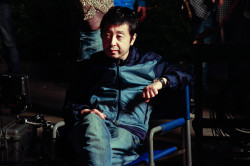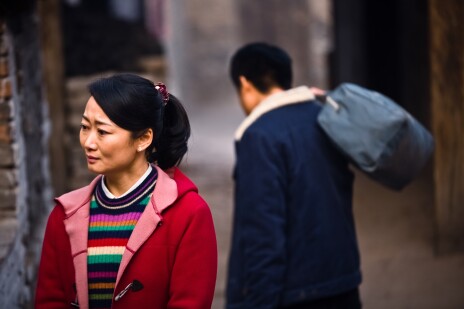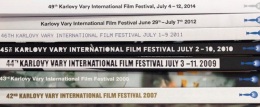Archive of films Mountains May Depart / Shan he gu ren
The Chinese title literally means “Mountains and rivers, old acquaintance,” suggesting the permanence of all three. The translation suggests that this needn’t always be. “Mountains may depart, like departing friends,” director Jia Zhangke explained at Cannes about the unusual title of his film. Using as a backdrop the story of three characters who were once bound by friendship, the renowned filmmaker sketched an image of modern Chinese transformation that doesn’t conceal the nostalgia for a time when people were connected by something other than money.
Synopsis
China. The last day of the year 1999 in the mining town of Fenyang. Two friends are vying for the attention of the beautiful Tao: Zhang has his own business, Lianzi is a miner. Tao hesitates but eventually chooses Zhang. The years pass, Tao gives birth to a son whom the father names Dollar. When the couple splits, Tao realizes that it would be better for the son to stay with his father. She returns home with enough money to help Lianzi, who is seriously ill. The years pass. It is 2025. The adult Dollar is studying in Australia, where he moved with his father. He no longer speaks Chinese and long ago lost contact with his mother, but one day he happens to hear a song that sounds familiar. Through its three characters, the film paints a clear, if somewhat didactic, picture of political, economic and social developments in China at the beginning of the new millennium. Today a famous director, Jia Zhangke was born in Fenyang, the setting for most of his films chronicling a changing world. Here, too, we can sense the filmmaker’s nostalgia for a time when people were connected by things other than money.
Eva Zaoralová (2012)
About the director

Jia Zhangke (b. 1970, Fenyang, China), a member of China’s sixth generation of filmmakers, grew up in a resettled family in a small town in the northern province of Shanxi. When he was 18, he began to study painting but he was also interested in literature and wrote his first novel in 1991. He graduated from the Beijing Film Academy and in 1995 established China’s first independent film production company, Youth Experimental Film Group. His writer-director pieces have been shown at numerous festivals, where they have won multiple awards. He debuted with The Pickpocket (Xiao wu, 1997). The films he had in competition in Venice, The World (2004) and Still Life (2006, Golden Lion) were the first to play Karlovy Vary KVIFF’s Horizons section also showed his A Touch of Sin (2013), which competed for the main prize at Cannes, as did Unknown Pleasures (Ren xiao yao, 2002) and 24 City (Er shi si cheung ji, 2008).
Contacts
mk2 Films
55, rue Traversière, 75012, Paris
France
Tel: +33 144 673 111
Fax: +33 143 072 963
E-mail: [email protected]
www: www.mk2.com
About the film
Color, DCP
| Section: | Horizons |
|---|---|
| Director: | Jia Zhangke |
| Screenplay: | Jia Zhangke |
| Dir. of Photography: | Yu Lik-Wai |
| Music: | Yoshihiro Hanno |
| Editor: | Matthieu Laclau |
| Art Director: | Liu Qiang |
| Producer: | Ren Zhonglun, Jia Zhangke |
| Production: | Shanghai Film Group Corporation, XStream Pictures |
| Coproduction: | MK2 Productions, Runjin Investment, Office Kitano |
| Cast: | Zhao Tao, Zhang Yi, Liang Jin Dong |
| Sales: | mk2 Films |










 Accommodations
Accommodations Festival Pass, tickets
Festival Pass, tickets History
History Contacts
Contacts Archive of films
Archive of films KVIFF Talks
KVIFF Talks Industry Days Programme
Industry Days Programme KVIFF Eastern Promises
KVIFF Eastern Promises Videogallery
Videogallery Photogallery
Photogallery Contacts
Contacts Posters of the 57th KV IFF
Posters of the 57th KV IFF Festival Guide
Festival Guide